A recap of the situation a letter writer brought to Washington Post advice columnist Carolyn Hax:
“Tell My Son” and wife adopted a baby born to a teenage niece. Now age 5 or 6, Jake has always known he was adopted. His parents showed him a photo of his birth mom, Tara, when he was old enough. They told him he could get more information about his birth parents any time he wanted.
At some early point the wife was advised to “never give Jake more information than he wants.”
Due to geographic distance, Jake and Tara have seen each other only a handful of times, and the parents report that Jake has never connected with her picture. Tara is a little awkward during visits, and the letter writer says “she avoids us when she’s visiting.”
 With an upcoming annual visit, Tara would now like to begin to cultivate a more authentic relationship with her son. Her big ask of Jake’s parents is that they give Jake the truth about her.
With an upcoming annual visit, Tara would now like to begin to cultivate a more authentic relationship with her son. Her big ask of Jake’s parents is that they give Jake the truth about her.
But the wife wants to stick with that original advice, the source of which we don’t know. Never give Jake more information than he wants.
Complicating factor: when Jake’s sister, also adopted, saw her birth mother 3 years ago, Jake was concerned “that lady” would take her away.
“Tell My Son’s” family is recommending to get things out in the open since full disclosure is bound to happen anyway. But the wife clings to that original advice. Never give Jake more information than he wants.
Carolyn suggests the parents need to get on the same page. I can’t tell from her answer which page that is, but that she is recommending a unified front.
She also suggests that Tell My Son & wife get some adoption-competent help (yay!) to “develop a strategy for bringing Jake his full truth that minimizes the potential for (further) bad associations.”
This Time with Commentary
Let’s examine further, shall we?
“Tell My Son” and wife adopted a baby born to a teenage niece. Now age 5 or 6, Jake has always known he was adopted. His parents showed him a photo of his birth mom, Tara, when he was old enough, along with the statement that he could get more information about his birth parents any time he wanted.
This is a low bar for openness in adoption. Telling a child he was adopted and showing him a picture of a birth parent may be rudimentarily necessary but are by no means sufficient in themselves to help the child build his identity and integrate his pieces over the years.
And how would this fly for a toddler, which Jake must have been at the time he saw the picture? Hey, Jake. Here’s a picture of your grandparents who live across the country. Let us know when you want more information about them. We’ll wait for you to give us the green light.
At some early point the wife was advised to “never give Jake more information than he wants.”
Who gave this advice? Replace “birth parent” information with “grandparent” information and see how ridiculous it is to wait until a small child takes the lead. Kids are less confused by family relationships than we think they are.
An Alternate Hypothesis on the Lack of Connection
Due to geographic distance, Jake and Tara have seen each other only a handful of times, and the parents report that Jake has never connected with her picture. It sounds like Tara may be a little awkward during visits, as the letter writer says “she avoids us when she’s visiting.”
Is it unusual not to connect with a picture?
And of course Tara is awkward! As a teenager she experienced the trauma of a childectomy and is treated like an outsider/interloper by her own family members.
In my observations of adoptive family dynamics, the kiddos take their cues from the adults, especially regarding open adoption relationships. In fact, adoptees tell us they tend to develop a spidey-sense about their parents approval/disapproval, and are liable to subjugate their own curiosities and desires when those desires are in conflict with their parents’.
Why is Telling the Truth Such a Big Ask?
With an upcoming annual visit, Tara would now like to begin to cultivate a more authentic relationship with her son. Her big ask of Jake’s parents is that they give Jake the truth about her.
Seems like delivering truth should be a given. Age appropriately, of course, Jake should be receiving his story, his truth, in a loving and connected way. You can’t really have a trust-based relationships if you’re not offering truth.
But the wife wants to stick with that original advice. Never give Jake more information than he wants.
I wonder if the wife may have other reasons for not wanting to be more authentically open to Tara. For example, she may be coming to her open adoption relationships from an Either/Or mindset rather than a Both/And heartset. The closed adoption era held the premise that for one mom to be legitimate, the other must be negated.
Following that original advice gives the wife a way to elevate her own legitimacy by minimizing Tara’s presence and importance.
Kidnapper!
Complicating factor: when Jake’s sister, also adopted, met with her birth mother 3 years ago, Jake was concerned “that lady” would take her away.
I’m wondering how a toddler would get the idea that a birth mother steals children. Has Jake has been watching Lifetime movies? Where else could such a notion originate? Is there someone else close to him who has such an idea of birth parents?
And if so, is that based on fact or fear?
Carolyn Hax Could Have Said
Dear “Tell My Son,”
Much of the trouble you find yourselves in could be resolved — and future similar problems prevented — with an intentional shift from Box 2 (obligation-based) to Box 3 or 4 (relationship-based) on this open adoption grid.
Just because you’re showing pictures and having the occasional visits doesn’t mean you’re open. It means you offer contact. But understand that contact ≠ openness.
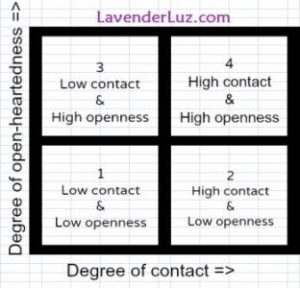 To make this shift, you move from being in your open adoptions out of obligations imposed on you to being in your open adoptions out of the desire to build authentic relationships — embraced by you. It means you acknowledge and attend to your own fears and insecurities.
To make this shift, you move from being in your open adoptions out of obligations imposed on you to being in your open adoptions out of the desire to build authentic relationships — embraced by you. It means you acknowledge and attend to your own fears and insecurities.
And by all means, make sure you two are on the same page as you make this intentional shift. And do find an adoption-competent therapist to assist you on this journey, which you will be on for many years to come (do not think you’re seeking only a solitary quick fix).
~~~~~
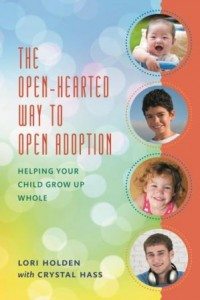 Lori Holden, mom of a teen son and a teen daughter, blogs from Denver. Her book, The Open-Hearted Way to Open Adoption: Helping Your Child Grow Up Whole, is available through your favorite online bookseller and makes a thoughtful anytime gift for the adoptive families in your life.
Lori Holden, mom of a teen son and a teen daughter, blogs from Denver. Her book, The Open-Hearted Way to Open Adoption: Helping Your Child Grow Up Whole, is available through your favorite online bookseller and makes a thoughtful anytime gift for the adoptive families in your life.


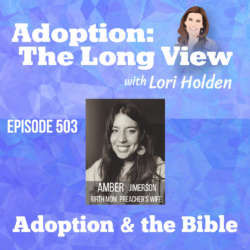
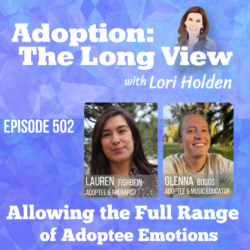
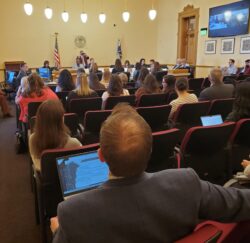
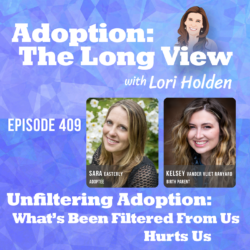

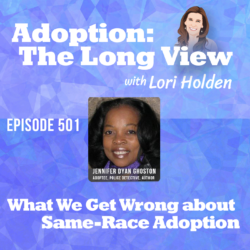

3 Responses
I am relieved that Hax did not say anything terrible in regard to this, and the comments she highlighted raised pertinent issues. But your response is much more thorough and useful.
Echoing a above that your answer is much more useful. I was surprised that Hax left her advice so vague — that seems out of character with the column.
This is especially a good point: “In my observations of adoptive family dynamics, the kiddos take their cues from the adults, especially regarding open adoption relationships. In fact, adoptees tell us they tend to develop a spidey-sense about their parents approval/disapproval, and are liable to subjugate their own curiosities and desires when those desires are in conflict with their parents’.”
Contrasting Carolyn Hax to other advice columnists, it’s commendable that she didn’t give advice out of her zone of knowledge/expertise. She knew to suggest finding an adoption counselor.
I’ll add that finding an effective one who is also a good fit takes a lot of due diligence.